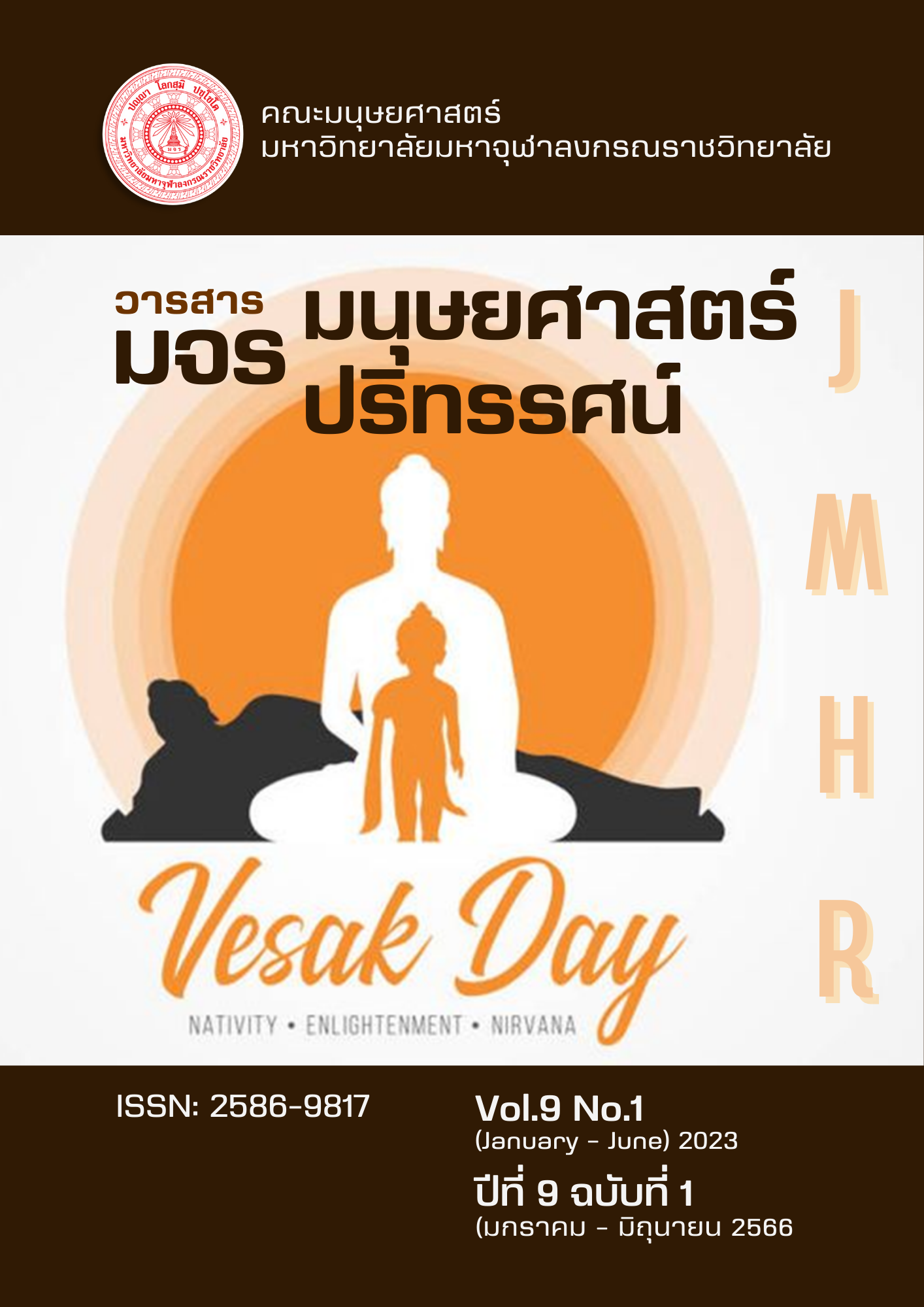ภัยโควิด-19 : การจัดการความเครียดในยุควิถีชีวิตใหม่
คำสำคัญ:
ความเครียด, การจัดการความเครียด, ยุควิถีใหม่, โควิด-19บทคัดย่อ
เมื่อกล่าวถึงคำว่า “ความเครียด” หรือ “Stress” เป็นคำสั้น ๆ ที่ทุกคนไม่ต้องการพบเจอ ไม่ต้องการให้เข้ามากระทบกับตัวเอง แต่ความเครียด เป็นสภาวะที่สามารถเกิดขึ้นได้กับกับทุกคนทุกชีวิตในโลกนี้ ความเครียดเป็นสาเหตุหนึ่งที่จะทำให้ชีวิตขาดความสุขและความเครียดของแต่ละคนมีแตกต่างกันไปตามวัยและปริมาณความต้องการความสุข สาเหตุที่ทำให้เกิดความเครียด แบ่งเป็น 3 ด้าน คือ 1. ทางด้านร่างกาย 2. ทางด้านจิตใจ และ 3. ทางด้านสังคม และที่สำคัญในโลกยุคปัจจุบันที่มีการแข่งขันกันสูงมากทั้งด้านเศรษฐกิจ ด้านสังคม รวมถึงโรคภัยพิบัติจากไวรัสโคโรน่า (Covid-19) จนทำให้กลายเป็นคำกล่าวใหม่ในยุคปัจจุบันว่า วิถีชีวิตใหม่ หรือ New normal ดังนั้น การจัดการความเครียด (Stress Management) สามารถทำได้อย่างน้อย 3 วิธี คือ 1. การใช้หลักธรรมทางพระพุทธศาสนามาเรียนรู้และปฏิบัติ เช่น การปฏิบัติภาวนา 4 เป็นต้น 2. การใช้หลักจิตวิทยาตะวันตกเข้ามาเรียนรู้ทำความเข้าใจและปฏิบัติ ตามหลักทฤษฎีของ Ryff หรือหาก ทั้งสองวิธีไม่ได้ผล อาจจำเป็นต้องรักษาโดยวิธี 3. การรักษาทางการแพทย์ โดยพิจารณาจากสาเหตุร่วมคือ ร่างกาย จิตใจและสิ่งแวดล้อม เพื่อที่จะได้ปรับตัวไม่ให้มีความเครียดเข้ามาในชีวิตและบริหารความเครียดได้อย่างดีในสังคมยุคปัจจุบันหลังโควิด-19
เอกสารอ้างอิง
กรมสุขภาพจิต กระทรวงสาธารณสุข. (2555). คู่มือคลายเครียดฉบับปรับปรุงใหม่. นนทบุรี : สำนักพัฒนาสุขภาพจิต กรมสุขภาพจิต.
ชูทิตย์ ปานปรีชา. (2529). จิตวิทยาทั่วไป. นนทบุรี : มหาวิทยาลัยสุโขทัยธรรมาธิราช.
ประกายทิพย์ ศิริวงศ์. (2552). การศึกษาความเครียดและการเผชิญความเครียดของผู้ป่วยมะเร็งเต้านมก่อนผ่าตัด. วารสารพยาบาลศิริราช, 3(1), 1-14.
พระพรหมคุณาภรณ์ (ป.อ.ปยุตฺโต). (2549). บทนําสู่พุทธธรรม: ชีวิตงาม สังคมดี ธรรมชาติเป็นรมณีย์. กรุงเทพฯ : ผลิธัมม์.
ราชบัณฑิตยสถาน. (2528). ศัพท์บัญญัติอังกฤษ-ไทย ไทย-อังกฤษ (พิมพ์ครั้งที่ 5). กรุงเทพฯ : ไทยมิตรการพิมพ์.
สงวน สุทธิเลิศอรุณ. (2553). พฤติกรรมมนุษย์กับการพัฒนาคน. กรุงเทพฯ : ทิพยวิสทุธิ์.
สํานักงานราชบัณฑิตยสภา. (2563). พจนานุกรมศัพท์นิเทศศาสตร์ ฉบับราชบัณฑิตสภา. กรุงเทพฯ : สํานักงานราชบัณฑิตยสภา.
สถาบันไทยพัฒน์. (2548). คู่มือนำทางสร้างองค์กรพร้อมผัน. กรุงเทพฯ : สถาบันไทยพัฒน์.สุดสบาย จุลกทัพพะ. (2564). ความเครียด. สืบค้น 26 กันยายน 2565, จาก https://www.si.mahidol.ac.th/sidoctor/e-pl/articledetail.asp?id=50
Ryff, C.D. (1989). Happiness is everything, or is it? Explorations on the meaning of psychological well being. Journal of Personality and Social Psychology, 57(6), 1069-1081.
ดาวน์โหลด
เผยแพร่แล้ว
รูปแบบการอ้างอิง
ฉบับ
ประเภทบทความ
หมวดหมู่
สัญญาอนุญาต
ลิขสิทธิ์ (c) 2023 วารสาร มจร มนุษยศาสตร์ปริทรรศน์

อนุญาตภายใต้เงื่อนไข Creative Commons Attribution-NonCommercial-NoDerivatives 4.0 International License.






